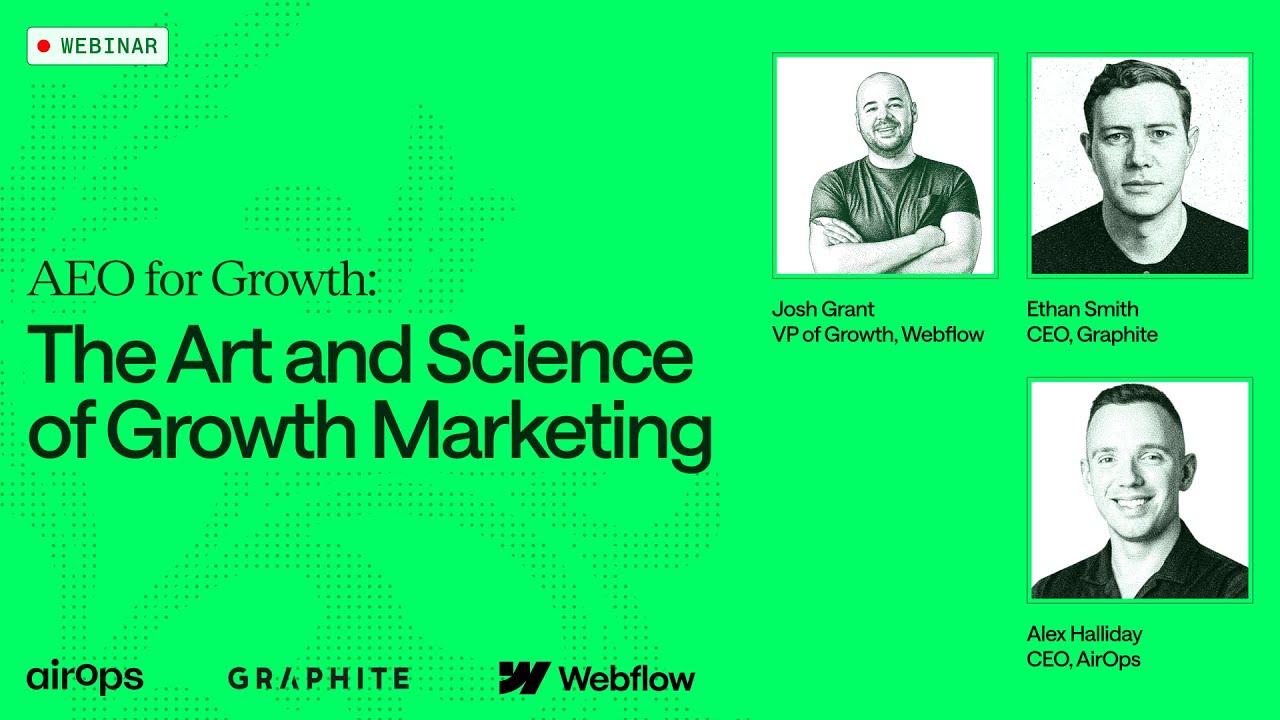Webinar Recap: How to Explain Search Changes to Your Team with Seer Interactive
-no-date.avif)
In a recent AirOps webinar, Wil Reynolds and Alisa Scharf from Seer Interactive shared invaluable insights on how to effectively communicate the impact of AI and search changes to leadership, teams, and clients.
By investing in AI literacy and leveraging tools like Chat GPT, SEO professionals can translate technical shifts into compelling business narratives that drive action and secure buy-in.
Seer Interactive is a performance marketing agency built for teams who care about strategy and scale. Founded by Wil Reynolds in 2002, they’ve made a name for themselves by going beyond surface-level SEO and PPC. Seer works with big brands, brings a people-first mindset to everything they do, and is especially good at turning complex analytics into clear, actionable growth plays.
Connect with Wil Reynolds and Alisa Scharf on LinkedIn!
Top Takeaways
- Deep Understanding Drives Results
The success of any SEO strategy hinges on comprehending both client needs and their customers' behaviors. This dual understanding enables more targeted and effective campaigns. - Business Alignment is Critical
SEO success requires perfect alignment with client business goals and internal processes. This alignment ensures strategies deliver meaningful business impact. - Adapt to AI-Driven Search
The future of search is increasingly AI-driven. Understanding how to optimize for AI systems and large language models is becoming as crucial as traditional SEO tactics. - Invest in AI Literacy
Staying competitive requires ongoing investment in AI knowledge and capabilities. This isn't just about tools - it's about understanding the changing search landscape.
Standout Quotes
On optimizing for LLMs:
"People don't have fewer questions. That's what we all have to remember. We don't have like a there's not like a Oh, my God! The demand of questions fell off a cliff. People still have these questions. Just because you're not getting the same amount of traffic doesn't mean that people have dropped in their number of questions. They're just asking them in new places. - Wil Reynolds
Understand the client and their goals when advocating for SEO changes:
"The biggest thing to me is we work with so many different clients, and everybody is structured differently...And so the key thing is really understanding, how does this specific business function? One small change we made a few years ago is we used to start engagements and say, Okay, let's start with these quick wins. And then sometimes it would really ruffle feathers because the the Dev team sees it. They're like, what do you mean? Quick wins. These aren't quick wins. You don't know our template. You don't know how difficult this is, and you're starting off kind of on the wrong foot. So really trying to what we push our team to do is meet the client where they are, meet all of the role players where they are, have an idea of of who's buying, whose support we are going to need, and have a plan to remove any roadblocks that need to be removed. - Alisa Scharf
Empowering teams with AI literacy
Seer Interactive recognized the importance of investing in learning and development to prepare their team for the AI-driven future of search. They implemented a comprehensive training program, including:
- Weekly internal meetings focused on prompting, AI exercises, and explainer videos
- Certification through the Marketing AI Institute to establish a common foundation
- Encouraging team members to build AI-powered solutions to address day-to-day friction points
By equipping their team with the necessary skills and knowledge, Seer created a culture of innovation and empowered employees to embrace AI in their workflows.
Monitoring brand presence in LLMs
Wil Reynolds emphasized the significance of regularly monitoring brand presence in large language models (LLMs) to gain insights and inform SEO strategies. His approach involves:
- Running weekly prompts to assess how the brand is described across different LLMs
- Analyzing the language used to identify improvements and track progress over time
- Experimenting with high-quality, verticalized content that showcases deep industry expertise
- Avoiding quick-win tactics and focusing on establishing a strong, authentic presence in LLMs
Best practices and key learnings
Invest in AI literacy
Empower your team by providing AI training, certification programs, and opportunities to experiment with AI-powered solutions. This will foster a culture of innovation and enable your team to effectively leverage AI in their workflows.
Speak the language of leadership
Translate SEO metrics and initiatives into the language of business impact. Understand what matters most to executives and align your reporting and communication accordingly. Use frameworks like "What, So What, Now What" to craft compelling narratives.
Meet clients where they are
Assess your client's audience and their adoption of AI search platforms using tools like Spark Toro. Tailor your SEO strategies and recommendations based on the specific needs and priorities of each client.
Experiment and iterate
Embrace a culture of experimentation and continuous improvement. Regularly test new AI workflows, monitor brand presence in LLMs, and iterate based on the insights gained. Don't be afraid to push boundaries and explore innovative approaches.
Collaborate across functions
Foster strong relationships with cross-functional teams, including product, engineering, and content. Seek to understand their goals, processes, and pain points to effectively align SEO initiatives and secure buy-in.
Take Action: Transform Your SEO Strategy
Ready to elevate your SEO approach with AI-powered insights? Book a demo to see how AirOps can help you:
- Translate complex SEO data into actionable insights
- Streamline your content optimization process
- Stay ahead of AI-driven search trends
Win AI Search.
Increase brand visibility across AI search and Google with the only platform taking you from insights to action.
Get the latest on AI content & marketing
Get the latest in growth and AI workflows delivered to your inbox each week
.avif)





